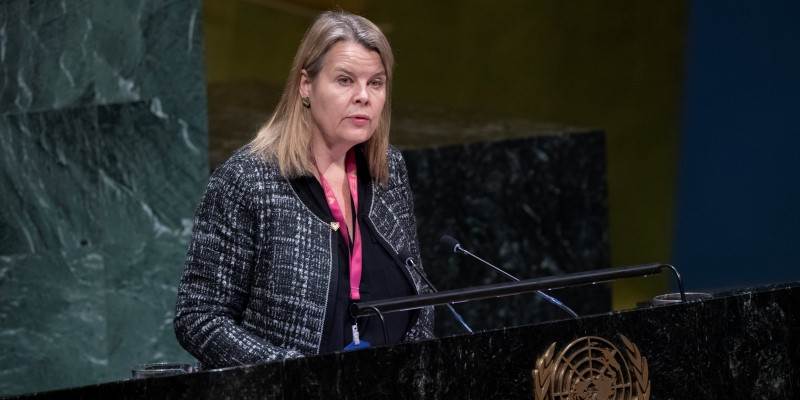President,
Norway has had the honour of coordinating the informal consultations on draft resolution [A/73/L.41] on sustainable fisheries. Today I am pleased to introduce that text on behalf of all its co-sponsors.
On behalf of the coordinator Andreas Kravik, I would like to thank Director Gabriele Goettsche-Wanli and the staff at the Division for Ocean Affairs and the Law of the Sea for their expertise, professionalism and invaluable support before and during the consultations.
This year’s draft resolution is a further step forward in the conservation and management of fish stocks, which are an essential resource for sustainable development in much of the world.
President,
Sustainable food from aquatic ecosystems is playing an increasingly critical role in global food and nutrition security. Fisheries are immensely important for employment, trade and economic well-being throughout the world. The draft resolution addresses vital issues such as securing sustainable small-scale fisheries; combating illegal, unreported and unregulated fishing; addressing fishing overcapacity; further improving sub-regional and regional cooperation to achieve sustainable fisheries management; and promoting the use of scientific advice in developing, adopting and implementing conservation and management measures.
It also addresses relevant issues dealt with in other UN forums. These include environmental concerns such as marine pollution and marine litter – particularly plastics and microplastics, anthropogenic underwater noise and the impacts of global climate change. Another important issue that is addressed is the need to ensure decent working conditions in fisheries and other maritime sectors.
President,
Norway is pleased to join many others in co-sponsoring draft resolution [A/73/L.35], ‘Oceans and the law of the sea’, which will be introduced by Natalie Morris-Sharma from Singapore. We thank Ms Morris-Sharma for her careful stewardship and effective leadership during the two rounds of consultations.
The draft resolution addresses important issues related to the implementation of the Law of the Sea, and we fully support the resolution and the parameters it sets for activities in the oceans.
The preamble of the draft resolution reaffirms that the United Nations Convention on the Law of the Sea sets out the legal framework within which all activities in the oceans and seas must be carried out, and Norway fully supports this view. The Convention provides clarity with regard to both obligations and rights of states. This framework is indispensable for the sustainable use of marine resources, protection of the marine environment, the safety and security of shipping, international and regional cooperation, and marine scientific research.
President,
The oceans have huge potential when it comes to meeting the world’s needs for resources, creating jobs and fostering economic and social development. But we will not be able to realise this potential without sustainable growth in ocean-based industries. This year Norway’s Prime Minister, Erna Solberg, together with heads of state and government of coastal states all around the world, established the High-level Panel for a Sustainable Ocean Economy.
The Panel will harness leading scientific expertise from around the globe and consider evidence-based proposals for dealing with the global ocean crisis, including proposals on sustainable fisheries, ocean-based energy solutions, tourism, new approaches to marine protected areas, and the ocean economy. The Panel is committed to catalysing bold, pragmatic solutions for ocean health and wealth that support the Sustainable Development Goals and build a better future for people and planet.
President,
The obligation to protect and preserve the marine environment is clearly set out in the Convention, and states are required to take necessary measures to prevent, reduce and control pollution of the marine environment.
Marine litter is one of the biggest environmental problems of our time. Every year, around 8 million tonnes of plastics end up in the oceans. Most of this litter comes from land-based sources, because many countries have inadequate waste management systems. It is therefore vital to improve waste management in developing countries, increase awareness about the issue of marine litter, and facilitate effective clean-up programmes. Norway is playing a leading role in the global efforts to promote clean and healthy oceans. The development programme to combat marine litter is a key element of the Government’s ocean efforts, and Norway has substantially increased funding for efforts to deal with this problem.
Norway has worked to ensure that the prevention of marine pollution, including marine plastic litter, is a key theme for the Problue Trust Fund, which was recently established by the World Bank. Norway has provided NOK 125 million to the Fund this year.
President,
Promoting and facilitating marine scientific research is an essential element of the Convention, and vital for achieving the sustainable use and conservation of the oceans. Norway strongly supports the decision to focus next year’s discussion at the Informal Consultative Process on the theme ‘Ocean Science and the United Nations Decade of Ocean Science for Sustainable Development’.
President,
Norway is a steadfast supporter of the process of developing a new instrument for the conservation and sustainable use of biodiversity in areas beyond national jurisdiction.
We are fully aware of the challenges that lie ahead, as the Conference will need to resolve highly complex and sensitive issues. However, we remain hopeful that we will be able to reach an agreed outcome through constructive and flexible negotiations between states, with the effective and flexible leadership of Rena Lee of Singapore.
I would like to conclude by expressing Norway’s appreciation for the hard work and cooperation of all the delegations involved in the informal consultations on these two draft resolutions. We hope that this constructive approach can be maintained as we continue to tackle the many complex issues relating to the oceans and fisheries.
Thank you.
